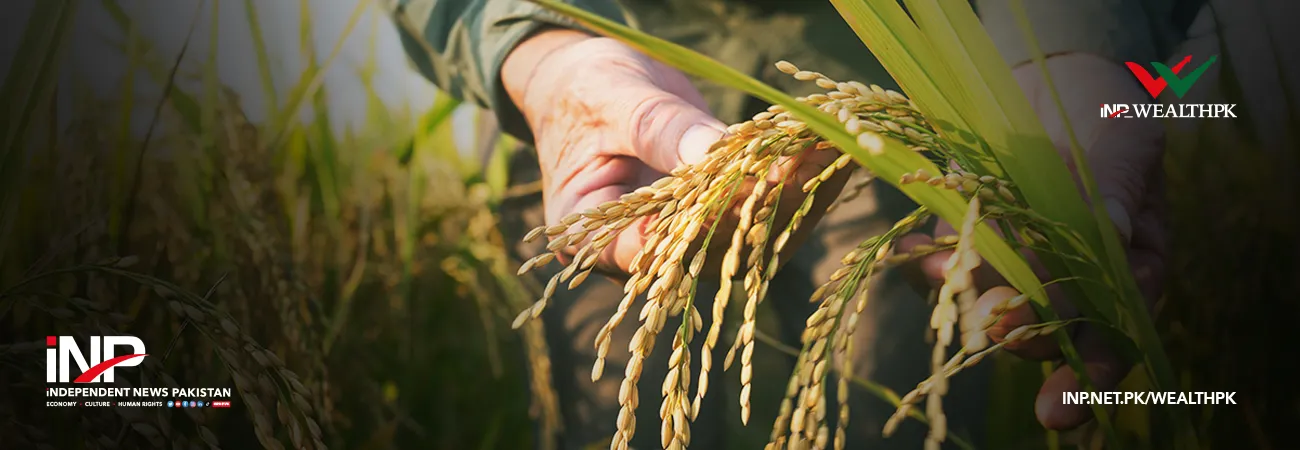INP-WealthPk
Arsalan Ali
Climate change has had a significant impact on rice production in Pakistan, affecting both its export potential and overall productivity, said Dr Babar Shahbaz, Director of the Institute of Agricultural Extension, Education & Rural Development, the University of Agriculture, Faisalabad. Talking to WealthPK, he said that rice is one of the most important staple foods and cash crops in Pakistan, but its production has encountered significant hurdles, including inefficient irrigation methods, vulnerability to insect pest infestations, and scarcity of an accessible workforce. However, he stated that precision agriculture (PA) holds significant potential for enhancing the economic efficiency and rice crop production.
He pointed out that rice is a vital staple food in countries like China, South Korea, and the Philippines, where PA has already shown promising adoption rates in rice cultivation. He added that PA could effectively assist farmers in making informed decisions regarding fertiliser use, pest control and irrigation. Babar Shahbaz mentioned that Pakistan, being one of the leading rice exporters, is facing challenges in its rice exports due to the impact of climate change. According to data from the Pakistan Bureau of Statistics (PBS), the export of rice during the 11-month period (July-May) of the current fiscal year amounted to $2.0018 billion, reflecting a decline of 12.05% compared to the same period last year, when it was $2.2761 billion.
The decline in exports was primarily observed in non-basmati rice, which declined by 14.06%, while basmati rice exports decreased by 6.83%. The significant drop in non-basmati rice exports was attributed to the August-September 2002 floods in Sindh, which had an adverse impact on the crop. According to the Trade Development Authority of Pakistan, basmati rice is primarily cultivated in Punjab, while non-basmati rice is grown in Sindh. The country’s top import markets for basmati rice include the United Arab Emirates, Kazakhstan, Saudi Arabia, Oman, Kenya and Somalia. Meanwhile, the top importing markets for Pakistan’s IRRI rice are China, Malaysia, Afghanistan, Kenya, Mozambique, and Madagascar, with China serving as the largest importing market for the variety.
Abid Qaiyum Suleri, the Executive Director of Sustainable Development Policy Institute (SDPI), a think tank, told WealthPK that the food security situation in Pakistan is deteriorating due to climate change-induced natural disasters. “This calls for immediate innovative measures to enhance productivity in order to meet the needs of a growing population,” he added. He said while there have been improvements in the productivity of certain crops, the diversification of the food basket continued to pose a challenge.
Abid Suleri highlighted the underutilisation of human resources in the agriculture sector, which has resulted in an overburdened system. Pakistan is now a net importer of agricultural products, with the import bill for food groups standing at a staggering $8.3802 billion during the July-May period of the current fiscal year, as per PBS data. The SDPI head said agriculture needs modern and innovative techniques to grow. Traditional farming would be obsolete in the next decade of precision agriculture. He emphasised that the desired level of agricultural productivity could be achieved through collaborative efforts among the universities, research institutes, credit institutions, and farmers themselves.
“The country’s agriculture sector is under immense pressure due to a 400% increase in population against a paltry 40% increase in agricultural areas. With the projected increase of 360 million people by 2050, it is essential to adopt innovative and modern approaches to agriculture, with a focus on precision farming practices,” he said. The SDPI executive director emphasised that farmers should be provided with solar tubewells and efficient irrigation technology, such as sprinkle and drip irrigation, to help them combat the already dire water situaton.
Credit : Independent News Pakistan-WealthPk




